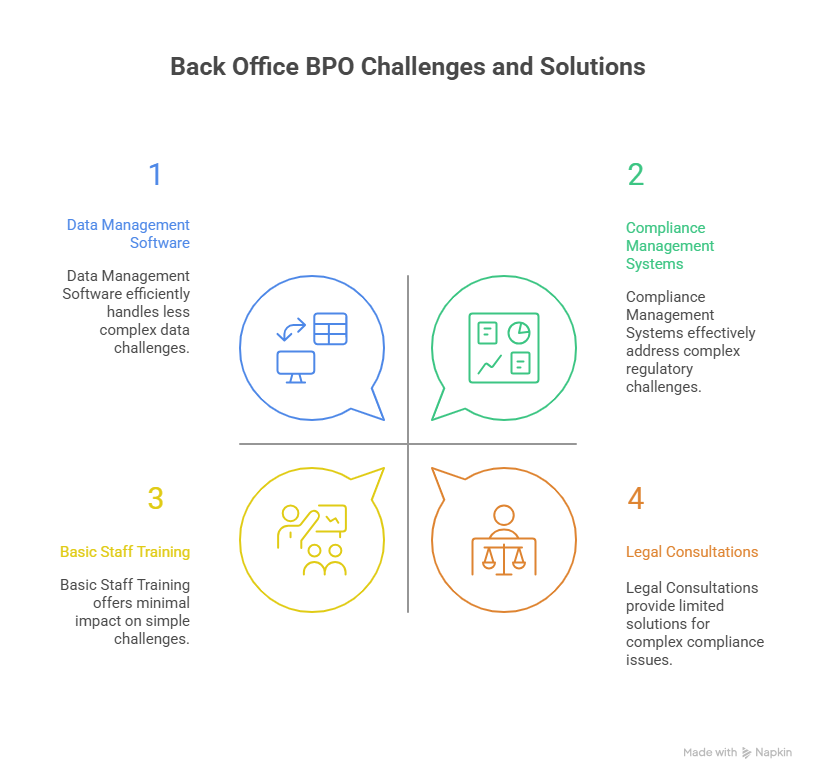Back Office BPO Operations
01 Feb 2024 By: Michael Kansky
Updated
Back office BPO refers to vital administrative tasks that support front office operations in businesses, especially within outsourcing companies. These functions ensure tasks run smoothly, keeping departments like finance, HR, and IT efficient. Though unseen by customers, back office BPO forms the backbone of customer-facing teams, driving overall company efficiency.

Back office support operations have been very important in today’s highly competitive market, being often overlooked or unnoticed but still having a great effect on customer satisfaction. These operations, which include functions like document and data management as well as customer support, are indirectly contributing to the creation of good customer experiences by the high volume and quality of efficiency and effectiveness they bring to the organization. The organization is then able to handle these tasks without any issues, have a good workflow, and support the scaling of its business through professional bpo management.
What is back office BPO?
Front office operations focus on customer service. Conversely, the back office consists of several functions that support the main business operations of the organization. These functions are often rather complicated and require particular knowledge and abilities. The major areas of back-office activities are data management, accounting, compliance, human resource management, and information technology services.
Though these activities do not contribute to revenues directly, they are still the key to the company’s overall operations. In fact, they are upholding the legal obligations and the financial stability of the company. They manage staff well and boost operations with technology.
Dive into the heart of your business: Explore Front Office Operations now!
Data Management
Data management is a critical back office function. It encompasses the gathering, the keeping, and the evaluation of the data. This data can serve as the basis for smart business choices in addition to increasing client satisfaction and efficiency of operations. Data management also guarantees the protection of the firm’s data and its safe-keeping against hackers by the means of cyber threats.
By means of proper data management, firms come to know what is trending, where the opportunities are, and what decisions to take in a strategic manner. It may also contribute to the enhancement of efficiency through the automation of performing the same task over time and the minimization of the occurrence of errors.
Accounting and Finance
Accounting and finance are other important aspects of back-office operations. This includes tasks such as managing the company’s finances. Moreover, it consists of preparing financial statements and making sure that financial regulations are adhered to. In addition, it includes the administration of the company’s liquidity position and making sure that there are enough funds available to cover its obligations.
Good financial management is capable of keeping a company in its best financial condition. It is also a means to get investors, to not fall into financial troubles. Besides, it will render honest company performance through valuable insights and thereby, help to steer its strategic decisions.
What is the Role of Back Office Operations in BPO Companies?
Back Office Operations are considered the backbone of Business Process Outsourcing (BPO) companies. The BPO companies provide a wide range of services to other businesses, giving them the opportunity to concentrate on their main activities. The BPO company is responsible for data entry, customer service, accounting, and HR management operations.
Outsourcing these tasks to the BPO company allows businesses to make significant savings on costs. Besides, it also makes the businesses to become more efficient and to put more emphasis on their core activities. The BPO companies have specialized knowledge and skills in handling back-end operations, which in turn enables them to deliver top-notch services to their clients.
Boost your business intelligence: Discover the power of Knowledge Process Outsourcing (KPO) today!
Customer Service
One of the most critical factors in the back-office operations of BPO firms is customer service. It includes taking care of customer questions, fixing problems, and supplying information regarding products and services. Technology is often the main element in supporting the customer service of BPOs. For instance, the use of customer relationship management (CRM) systems and artificial intelligence (AI).
The provision of an efficient and cost-effective multilingual customer service will be a factor that will help to realize the satisfaction of customers. It secures the trust of customers and also leads to more sales. Moreover, it can be a source of precious feedback that can be utilized for the betterment of products and services.
Learn how Multilingual Support can expand your business!
Human Resources Management
Human resources is another important aspect of back-office operations in BPO companies. This involves tasks like recruiting and hiring employees. Plus, managing employee benefits, and handling employee relations. BPO firms mostly depend on the HR management software for these purposes as they aim to make everything more efficient.
Good HR practices are a major factor in recruiting and keeping skilled workers. They not only bring up the level of employee happiness but also contribute to the company’s success. Furthermore, it could be an effective way to get rid of the worries related to the labor law and regulations compliance.
What are the Challenges in Back Office BPO Operations?
Even state governments envision integrated back offices that reduce overlap and turn these functions into strategic assets. This strategy enhances overall efficiency. It has increased the ability to make decisions and built efficiency structures. Thereby, supporting broader objectives.
While back office BPO operations are essential for the smooth running of a company, they also present several challenges. These include managing lots of data. It also means ensuring compliance with rules, managing costs, and keeping good service quality.
You can beat these challenges with good management. Use tech and keep improving. These challenges may serve as trials for companies, which eventually result in the improvement of their back-office functions and heighten their overall performance.

Data Management Challenges
Data management, approvingly, is one of the most demanding areas of back-office operations. Corporations, at times, find themselves handling data in such large quantities that it becomes a matter that consumes a lot of their time and is costly as well. Data has to be constantly managed so that it is accurate and secure, which can be hard achieved because of the threat posed by human slips and cyber invasions.
Companies can beat these challenges by using data management software. Adding data security measures and staff training in data management can be done by them too. Additionally, data analytics can be applied to the data in order to extract insights and support business decision-making based on the created information.
Compliance Challenges
Compliance is a big deal in back-office operations. Companies must follow many laws. The primary matters of these laws are finance, data protection, and employment. The absence of adherence can result in huge monetary fines, and lawsuits, and can also negatively affect the reputation of the entity involved.
For the purpose of avoiding any potential non-compliance factors, companies can build compliance management systems, provide employee training, and do regular checks on procedures. In addition, it is indispensable to be in constant communication with legal and compliance professionals to ensure that the compliance is up to the mark.
On the other hand, companies that are having a hard time dealing with compliance issues, especially the constantly changing data protection and employment law rules, may find the engagement of a lawyer beneficial. One instance where the presence of a supportive cybersecurity attorney could turn out to be extremely beneficial is when he/she would take the legal landscape, ensure compliance with the standards, and thus prevent the organization from being breached.
Technology in Back Office BPO Operations
Technology is key in back office bpo services. It streamlines tasks, boosts efficiency, and betters service quality. It tackles challenges like data handling and compliance.
Different technology tools, which include data and HR software as well as accounting and compliance systems, are among the various tech tools. They lubricate the operations, reduce errors, and improve the precision and trustworthiness of the data.
Automation
Automation is essential for back office operations, as tech is employed to carry out activities like data entry, invoicing, and payroll processing. It increases productivity, reduces errors, and makes it possible for employees to deal with more challenging tasks.
Robotic process automation (RPA), AI, machine learning, and automated workflow systems are the types of technology that help cover from the basic data entry to the complex decision-making process. Thus streamlining the processes across various domains.
Uncover the impact of AI and Automation in BPO operations!
Cloud Computing
Cloud computing is crucial for back office tasks, letting you use software and services online instead of on each computer. It cuts costs, boosts access, and makes scaling easier.
Services like Software as a Service (SaaS), Platform as a Service (PaaS), and Infrastructure as a Service (IaaS) offer everything from data management to HR systems.
Skyrocket your SaaS MRR: Dive into 11 proven Lead Gen Strategies today!
Trending Now
A Spiceworks article talks about the technological transformation in the back-office business process outsourcing (BPO) area caused by artificial intelligence (AI). It claims that in such a scenario management practices will not only have a more efficient but also a highly pleased and engaged work force. The front of the AI’s impact on the U.S. job market is shifting from a pure replacement in the case of back-office positions to considering tech as a facilitator of productivity rather than a one that takes away security. Leaders are encouraged to educate their teams on AI’s benefits, helping employees focus on meaningful tasks and take on more strategic roles.
The article also underscores the importance of upskilling and training to close the digital competency gap, ensuring employees can effectively use AI. Some research points out a correlation in terms of job satisfaction between automation and inter-departmental staff movement, thus portraying the story of AI in IT as a win-win scenario for staff engagement. Proper handling of AI through education and training in the back-office operations can not only result in high productivity but also job satisfaction.
Conclusion
Ultimately, the success of back office processes is foundational to the organization’s success, influencing everything from resource allocation to strategic initiatives. With the right staff and a focus on innovation, businesses can navigate the intricacies of today’s business environment, seizing new opportunities and fostering long-term relationships with clients. This holistic approach, blending traditional and modern back offices, enables companies to not only meet but exceed customer and market expectations, securing their position in a competitive landscape.
“Operations is where the rubber meets the road. It’s one thing to have a vision; it’s another to execute it.”
– Larry Page
Boosting your back office operations can significantly improve operational efficiency, reduce costs, and allow you to concentrate more on your business’s core competencies. Ready to elevate your business efficiency and customer satisfaction to the next level? Check out HelpSquad! With an affordable starting rate of just $8.50 per hour, you can enhance your business operations with our professional virtual assistants and our 24/7 customer service team. Start your trial today and experience the future of BPO with HelpSquad.
What is BPO of the back office?
Back office BPO (Business Process Outsourcing) is a situation in which a company entrusts to a third-party provider its non-customer-oriented activities such as data management, accounting, compliance, human resources, IT support, etc. Back office BPO services do not interact with the end-users directly, but rather make sure that the business continues to operate with accurate financial records, secure data, well-supported staff and smoothly running systems in a quiet manner.
Why are the back office operations so essential for customer service?
Although the back office processes are deemed “invisible,” they nonetheless play a significant role in the customers’ perception at the front end. The application of correct data, rapid internal workflows, legal processes, and properly organized personnel culminate in reducing errors, speeding up responses, making orders smoother, and giving service that is more reliable. When the back office BPO is managed correctly, customers suffer from fewer delays and problems, and are thus more likely to remain loyal.
Backup BPO services involve what processing operations?
Usually, the back-office BPO processes include data management (collecting, storing, and analyzing business data), accounting and finance (billing, bookkeeping, reporting, compliance), HR management (recruiting, onboarding, payroll, benefits, employee relations), compliance support, and IT services. Some providers also handle “back office” customer support tasks, such as ticket processing or documentation, which indirectly support front-line teams.
What are the benefits of externalizing back-office functions for a company?
The process of outsourcing back-office operations helps the companies in different ways such as costs reduction, making the investment on tools and skilled personnel unnecessary, and getting the advantages of experts with high skills and well-established processes. Besides, it allows the internal teams to spend more time on their core functions such as product creation, sales, or maintaining customer relationships. In the case of professional BPO management, companies can grow faster, improve their work processes, and ensure compliance without having to invest in everything themselves.
Which are the biggest problems in back office BPO operations and what can be the solutions?
The most common issues faced are the management of huge data volumes, security of that data, compliance with laws related to finance, data protection and employment, cost control, and maintaining consistent quality of service. The companies can overcome these challenges through the deployment of advanced data management tools, strong security measures, well-defined compliance frameworks, staff training, and regular process reviews aimed at improvement.


